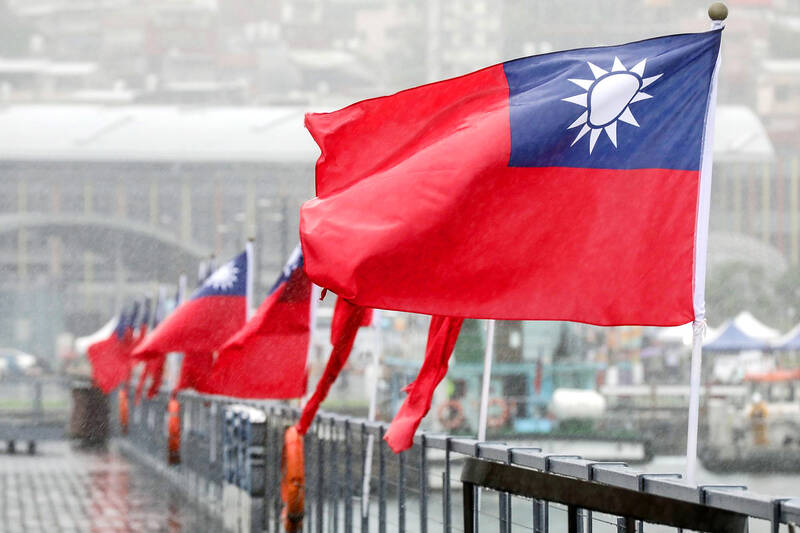A poll released by the Taiwanese Public Opinion Foundation yesterday showed 48.9 percent of Taiwanese support obtaining formal national independence, while 26.9 percent support maintaining the “status quo” and 11.8 percent support unification with China.
Support for Taiwanese independence topped support for maintaining the “status quo” by 22 percentage points and Chinese annexation by 37 percentage points, foundation chairman Michael You (游盈隆) said.
An overwhelming majority of respondents aged 20 to 44 voiced hope that Taiwan can declare independence in the future, he added.

Photo: Cheng I-hwa, Bloomberg
The result indicates most Taiwanese want the country to become independent, but understand the political constraints and the need for strategic patience, You said.
The number of respondents who wish Taiwan would become independent increased by 4.9 percentage points and those who showed support for maintaining the “status quo” increased by 2.9 percentage since last year’s survey, he said.
These changes indicate a “clear mainstream movement toward achieving national independence in the future,” he added.
A question in the survey asked respondents to choose between Taiwanese independence or unification with China should the “status quo” become unsustainable.
In response, 41 percent of those who initially supported the “status quo” said they would support independence, 18.3 percent switched to support unification with China and 40.7 percent said they would support the “status quo” regardless, You said.
Judging from the responses to that question, 59.9 percent of Taiwanese are pro-independence, 16.7 percent are pro-unification and 10.9 percent support extending the “status quo” indefinitely, he said.
Taiwanese independence is supported by a majority of respondents in every age group, all groups divided by educational attainment except associate degree holders and all professional groups including military service members, civil servants and teachers, he said.
Independence supporters make up the largest segment of respondents in every county and city except for Taoyuan, where support for the “status quo” prevailed, You said.
The poll showed that 72 percent of respondents identifying themselves as Democratic Progressive Party supporters are in favor of independence, 1 percent support the “status quo” and 5 percent support unification with China, he said.
Meanwhile, 18 percent of respondents identifying themselves as Chinese Nationalist Party (KMT) supporters are in favor of independence, while 36 percent support the “status quo” and 35 percent support unification, You said.
The poll found 43 percent of self-identified Taiwan People’s Party supporters also support independence, while 40 percent support the “status quo” and 8.5 percent support unification with China, he said.
The foundation conducted the survey on Aug. 14 and Aug. 15 with Taiwanese aged 20 or older via both cellphone and landlines. The survey had 1,081 effective samples, and claimed a margin of error of 2.98 percentage points.

POSITIVE DEVELOPMENT: Japan and the US are expected to hold in-depth discussions on Taiwan-related issues during the meeting next month, Japanese sources said The holding of a Japan-US leaders’ meeting ahead of US President Donald Trump’s visit to China is positive news for Taiwan, former Japan-Taiwan Exchange Association representative Hiroyasu Izumi said yesterday. After the Liberal Democratic Party’s landslide victory in Japan’s House of Representatives election, Japanese Prime Minister Sanae Takaichi is scheduled to visit the US next month, where she is to meet with Trump ahead of the US president’s planned visit to China from March 31 to April 2 for a meeting with Chinese President Xi Jinping (習近平). Japan and the US are expected to hold in-depth discussions on Taiwan-related issues during the

‘LIKE-MINDED PARTNER’: Tako van Popta said it would be inappropriate to delay signing the deal with Taiwan because of China, adding he would promote the issue Canadian senators have stressed Taiwan’s importance for international trade and expressed enthusiasm for ensuring the Taiwan-Canada trade cooperation framework agreement is implemented this year. Representative to Canada Harry Tseng (曾厚仁) in an interview with the Central News Agency (CNA) said he was increasingly uneasy about Ottawa’s delays in signing the agreement, especially as Ottawa has warmed toward Beijing. There are “no negotiations left. Not only [is it] initialed, we have three versions of the text ready: English, French and Mandarin,” Tseng said. “That tells you how close we are to the final signature.” Tseng said that he hoped Canadian Prime Minister Mark Carney

President William Lai (賴清德) yesterday bestowed one of Taiwan’s highest honors on Saint Vincent and the Grenadines (SVG) Ambassador Andrea Clare Bowman in recognition of her contributions to bilateral ties. “By conferring the Order of Brilliant Star with Grand Cordon on Ambassador Bowman today, I want to sincerely thank her, on behalf of the Taiwanese people, for her outstanding contribution to deepening diplomatic ties between Taiwan and SVG,” Lai said at a ceremony held at the Presidential Office in Taipei. He noted that Bowman became SVG’s first ambassador to Taiwan in 2019 and

A man walks past elementary school artworks at the Taipei Lantern Festival in Ximen District yesterday, the first day of the event. The festival is to run from 5pm to 10pm through March 15.